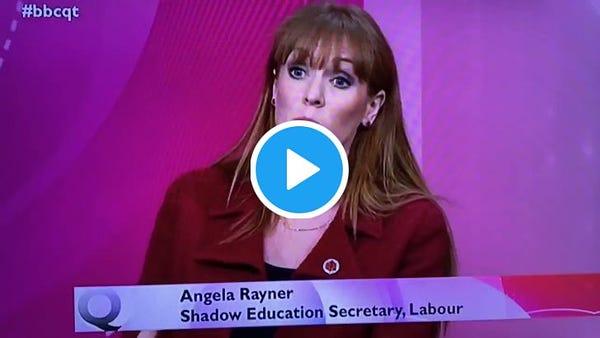The sins of the father, the emails of the daughter and the future of Woman's Hour...
All humans are forgiveable. Some are more forgiveable than others.
I want to start with a disclosure.
I think disclosures are vital in journalism because they reveal the wellspring of biases and the source of both sympathies and scores to settle.
In this case, I could easily not write this piece, seeing as one of the subjects of it has been very kind to me in the past and commissioned me, but today’s newsletter is on an issue that I can’t ignore. So…
Disclosure
I worked on a contracted writer basis — £1,000 per month — at The Daily Telegraph in 2015. During that time, predominantly contributing to the Comment Desk, I also wrote commissioned pieces for additional fees for Telegraph Men and Telegraph Women. The editor of the latter was Emma Barnett. She was a pleasant colleague and a supportive editor. While we were never friends, we had a friendly professional relationship. During that time I was entirely unaware of stories about her father’s illegal business dealings (running brothels that used trafficked women), her mother’s complicity with them, nor Emma’s awareness of what her father was doing before his activities were the subject of court cases.
It’s in that context that I sat down to read The Observer’s profile of Emma Barnett on the eve of her taking on the Woman’s Hour presenter’s chair. She has sat in on that show before and did a good job with a less forthright tone than she has applied on TV and as a daily host on 5Live. There’s no question that Barnett is a punchy interviewer, with an occasional tendency for the high dudgeon non sequitur (“Would you nationalise sausages?”)


The Observer profile is a decent piece of work that includes both praise and criticism from industry sources, named and unnamed, but one section rankled for me:
Born in Manchester to Orthodox Jewish parents, Barnett, 35, is the married mother of a toddler. Always outgoing and outspoken, she was involved in a local drama club in her youth, and went on to get involved with student journalism while at Nottingham University. Her mother, Michelle, trained as special needs teacher, while her father, Ian, was a businessman who then became the centre of a sensational drama briefly in 2010 when it was revealed that he had run a series of brothels, with the tacit if grudging consent of the Greater Manchester Police.
Understandably perhaps, Barnett, who has otherwise spoken of a happy childhood, does not talk about this doubtless painful subject. It has, however, provoked a recent flurry of internet shaming attempts since the Woman’s Hour job announcement. It is the kind of history-trawling, blame-gamery that will now shadow every move that Barnett makes. In the current climate of feminist revisionism Woman’s Hour is a hostile frontline.
This is an incredibly santised version of what occurred, just as Barnett’s own version of events, published in The Daily Mail when she took the 5Live job skims over the facts lightly, framing the presenter as the real victim while largely pushing the women exploited by her father out of the frame. All of this would perhaps be dismissable as the rationalisation of a traumatised daughter were it not for one aspect of the court case that is rarely referenced beyond social media shitposters and a line in the Manchester Evening News report on the court case:
Police found emails between Mr Barnett and his daughter Emma, talking about his ‘whores’.
That same report details how Barnett’s mother laundered cash from the brothels, photos of women advertised on websites were taken in the living room of the couple’s house, and how they spent huge amounts of money on cars and holidays.
While Emma Barnett’s account of what happened paints her father as a man who drifted into a bad scene, the court heard that a long list of seized assets included samurai swords, deactivated firearms and hundreds of photographs and videos of women from the brothels.
One woman, whose rescue triggered the court action, was trafficked from Lithuania on the promise of cleaning work and forced into prostitution. While Ian Barnett was not charged with trafficking offences, he still went to prison for a range of other offences. It was also discovered that Manchester Police had been complicit in a number of his schemes.
The question here is not simply one of ‘the sins of the father (and mother)’. It is undoubtedly true that Emma Barnett is not responsible for what her parents did, nor is she to blame for the fact that money from those activities directly funded her private schooling and then her university studies. Private school helped Emma Barnett get 3 A-levels. It sent her into a career where she has excelled. This stuff is interconnected.
She did not make those choices about her education. However, her public pronouncements on the story — limited to an article with her byline and a few brief comments when interviewed — as well as the evidence that, in her early twenties, she was aware of what her father was doing make things more complicated.
Emma Barnett has as a political interviewer offered no quarter and no forgiveness to professional politicians who have come into her sights. That’s perfectly acceptable. In fact, it’s probably what most listeners and viewers expect from a political interviewer. However, consider this hypothetical: How would she treat someone else in public life who had benefitted from their father’s criminal actions and been aware of those actions before he was taken to court?
It appears that Emma Barnett, in order for her own well-heeled and cosy life to continue, was willing to turn a blind eye. It’s understandable when the people she was turning a blind eye to were her parents and, had she not chosen a career in the media, it would be not worthy of comment now really.
But Emma Barnett’s work has been built on the judgement of others, the continuous questioning of their moral and political philosophies, and she will now take the presenter’s chair on a show specifically about women’s issues. Will Barnett recuse herself from running items on sex work? Will she offer a disclaimer before presenting such an item?
I very much doubt it. And that’s where the problem lies: The media has allowed Barnett to be absolved without first asking her to account for what she did. Why? Because she’s a pleasant person behind-the-scenes, whatever her onscreen and on-air demeanour, and the media in the UK will rally around their own. A working class woman, who didn’t go to the same expensive schools and universities, and who didn’t have the media connections that Emma Barnett has worked so hard to make, would not be granted that retribution.
Like everything in Britain, forgiveness has a class component and can be bought for the right fee. That’s not ‘internet shaming’ as The Observer tried to frame all criticism of Barnett’s role in her father’s schemes — it’s the truth.



